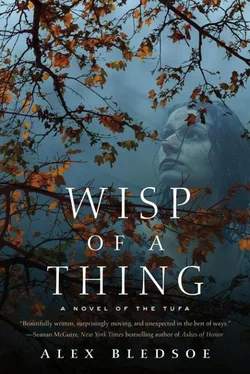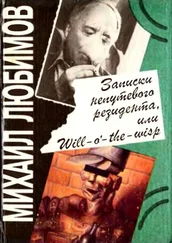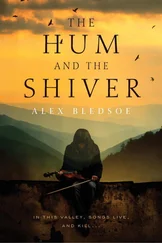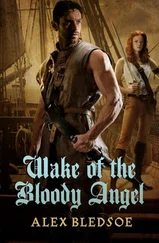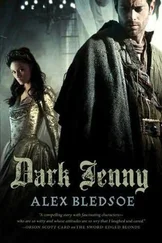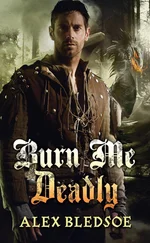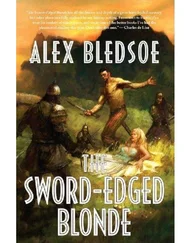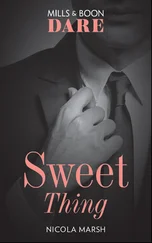“That’s the truth,” Rob agreed. “But please, no Dorothy jokes.”
Doyle popped the hood again. “What brings you here?” When Rob hesitated, Doyle added, “I’ve got my hands under your hood, you know. We’re practically engaged.”
Rob laughed. “Met a fellow who told me about Needsville, and I thought I’d see it for myself.”
“Told you what about it?”
“Well… about the Tufa.”
“You didn’t believe them stories, did you?”
“Didn’t tell me any stories, really,” he lied. “Just said it was an interesting place, and the folks were good musicians if you could get them to open up.”
“We do like our music,” Doyle agreed. “What do you play?”
Inside, Rob sighed with relief. Doyle didn’t recognize him. “Guitar, mostly. Mess around on keyboards sometimes. How about you?”
“Me? All I play is the stereo.”
Rob recalled something his college music history professor once said during a class: “In primitive societies, everybody sings. In agrarian societies, most people sing. In modern societies, hardly anybody sings.” Since Doyle knew about cars, had it cost him his cultural heritage? Or was Rob just generalizing about things he really didn’t understand? “So you don’t know any Tufa songs?”
“Everybody knows all the old mountain songs, but I don’t recall ever hearing a song that was specifically Tufa.”
“Huh,” Rob said noncommittally. “Well, how about… cave carvings?”
“Cave carvings?”
“Yeah, you know, like… words carved into the walls of a cave. Or a cliff somewhere, like that giant bird in Ohio.”
“Uh, I hate to break it to you, but we don’t have any cavemen or giant birds around here. The Tufa ain’t no different from anybody else: They live in houses, they got bills and cable and the Internet.”
Rob realized how patronizing he sounded, yet he’d come all this way…. “Anyone who might know about it? Either one, Tufa music or rock carvings—?”
Doyle crossed his arms, and Rob was suddenly conscious of the other man’s considerable physical size. “You know, we get a few strangers now and again coming through Needsville poking into the Tufa. They write books, put up Web sites, make their little reality shows for the History Channel, and promise the people here things that ain’t never gonna happen. If you smack even a dumb dog enough times, he learns to see it coming. We’ve been smacked a fair bit.”
Rob put up his hands. “No smacking here, I promise.”
“You say that now. But when you have to choose between either keeping your word to a bunch of strangers back in the hills, or signing on the dotted line in Nashville or L.A., you might not remember. I’ve seen it happen. There’s a song on the radio I know for a fact a fella who lives over on the highway toward Bristol wrote, but you don’t see his name on it. And ain’t no checks in his mailbox.”
The mechanic resumed work, and Rob tried to think of some way to convince him he meant no harm. But he wasn’t sure that was the truth. If the sequined man’s ludicrous story turned out to be right, what Rob sought here needed to be shared with the world. What would he do if he did find it, if it actually worked, and if he could, in fact, take it for his own?
Doyle dropped the ratchet handle in the toolbox. “Slide in there and try the ignition.”
Rob did, and the engine snapped to life. Doyle moved his toolbox and shut the hood. He listened to the car idle . “There you go. Sweet as.”
“What?”
“Huh?”
“‘Sweet as’ what?”
“It’s just a saying.” Doyle wiped his hands on a rag, then spotted something on the ground by his foot. He picked up a penny, faceup, and wiped the dirt from Lincoln’s profile. The omen seemed to indicate Rob could be trusted, if he read it right; certainly his grandmother had drilled him enough on signs and omens that he should read it right. Had the penny been facedown, it would’ve meant the opposite, and he wished that had been the case. It was always easier to send strangers on their way. He said, “I reckon I could introduce you to some people.”
“I’d appreciate it.”
Doyle looked hard at him. “You sure I don’t know you from somewhere?”
“I’m sure I don’t know you,” Rob said truthfully.
Doyle held up a small can of spray paint. “There’s a scratch on the right fender. I know how rental places are, so I’ll touch it up for you, if that’s all right. No charge.”
“Sure.”
It only took a second. Doyle gave the can to Rob. “Use this if you get any more dings.”
“Thanks.”
Doyle looked him over thoughtfully, and finally said, “So do you know where you’re staying in town?”
“I have a reservation at a motel called the Catamount Corner.”
“I know Mrs. Goins, the lady who runs it. How about I call you there when I get off work? Maybe we can go grab a beer or something, check out where some of the local boys play and sing.”
“That’d be great,” Rob said with genuine appreciation. “Really. Thanks.”
Doyle held out his hand. “Well, my name’s Doyle Collins.”
“Rob Quillen.”
Rob waited for the look of recognition, but it never came. Doyle said, “Pleased to meet you.”
Rob laughed. “Really?”
“Well, truthfully, I don’t know yet. But I bet I’ll find out pretty soon.”
An old pickup truck with a bunch of black-haired kids riding in the bed pulled in as Rob left the station. He knew he couldn’t keep his past a secret—somebody would eventually recognize him, he was sure—but he wanted to hold it off as long as he could. People got weird around famous people touched by tragedy, especially people famous because they were touched by it.
As he drove, Rob noticed something in the yard of an old shack ahead on the right. At first he thought it was one of those elaborate homemade mailboxes, fashioned into the shape of a tractor or a gas pump. Then it stepped into the road and blocked his way.
He had plenty of time to stop. The emu, an ostrichlike bird six feet tall and brownish green in color, stared at Rob’s vehicle with mildly stupid curiosity. Rob knew some people raised these birds for their meat, but this one appeared to be roaming loose, and in no hurry to get out of the road. Rob used his phone to snap a quick picture.
A wiry, dark-haired man in jeans and a denim jacket ran out of the shack. He had the distinctive Cloud County look, just like the boy. “Hey, hey ! Git outta here! ” An aluminum baseball bat flashed in the sun.
Rob’s muscles tensed in anticipation of a fight, but the man’s rage was directed at the emu, which took off and disappeared into the woods across the road. The man shook the baseball bat menacingly after the bird, then skulked off the way he’d come. He never even glanced at Rob.
Rob let out his breath in a long, heavy rush. Welcome to the land of the Tufa.
* * *
The road rose and fell several times before it topped a final hill and descended into the valley where, at the center, awaited Needsville, Tennessee.
Needsville’s “main street” was simply a wider stretch of the highway with buildings along either side. A lone traffic light flashed yellow to control access to a road winding up into the forested hills. Beneath the sign that identified the city limits, a smaller homemade placard advertised the Catamount Corner Motel, half a mile ahead on the left.
He found it easily enough and parked out front. The steps up to the porch sagged a little, but otherwise it seemed in excellent condition, with all the wood recently painted. He’d been afraid of some run-down fleapit used by truckers and fugitives.
Читать дальше
